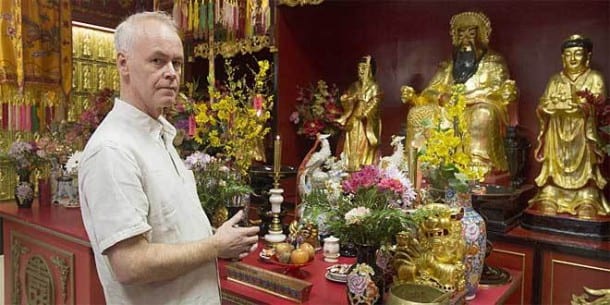MONTREAL, Canada—Controversies involving religious symbols like the Muslim hijab, and the Sikh kirpan, have been good for business for Ivan Drouin, who runs a company that conducts guided tours of Montreal.
When he first started “Tours Kaleidoscope” in 1996, Drouin organized visits to ethnic communities in Montreal for people who were planning to travel abroad to places like China, and Italy.
“We used ethnic neighborhoods to allow people to better understand the places where they would be going,” he said in an interview.
But then Drouin noticed a huge interest among locals who wanted to discover the city’s different ethnic neighborhoods.
During those outings, people would ask questions about religion, so he put together a program of seminars involving places of worship.
Drouin, 55, said excursions to places like Sikh temples, and Jewish synagogues, help to educate tourists, teachers, and students.
His guided tours became even more attractive when the Quebec Education Department added an ethics, and religious culture, program to schools in 2008.
“Teachers who had to teach that course were not trained, or had very little experience,” he said. “It was because of that, that certain school boards asked us to put together visits for professors who were giving the course.”
Drouin said teachers learn about different religious denominations during the outings, and also about the children that they would be teaching in elementary, and secondary schools.
“In Montreal, there are more, and more, schools with children who come from other countries that teachers didn’t know anything about,” he added.
Drouin said interest in learning about the Sikh community increased an extra boost after controversy erupted when a 12-year-old boy dropped his kirpan in a schoolyard in a Montreal suburb more than a decade ago. The story made headlines across Canada and the world.
“Even before the conflicts with the kirpan, or the veil being worn by Muslim women, we were already bringing in people,” he added.
“After these events, it became more important. School directors were wanting more information, and we gave them that opportunity.”
Drouin’s tours are “made-to-order” for schools, associations, travel agencies, or private companies, while many federal civil servants also take part.
The tours are organized in groups of between 10, and 15, and reservations are obligatory. Prices tend to be in the $15-20 range.
For a class of students, there’s a group rate of $5 per student.
Right now, according to Drouin, there’s a lot of interest in Islam.
“People want to know more about what a Muslim is, what the different trends of Islam are, and about the schools of Islam,” he said.
Drouin stressed each trip to a mosque, synagogue, or Sikh temple, is not just a quick visit — it can last up to two hours.
“We don’t just go for voyeurism, we go to try to understand, so that requires time,” he said.
Tours Kaleidoscope’s visits focus on history, culture, traditions, and religious beliefs.
Drouin cited a visit to a Sikh temple as one interesting experience because of the conditions attached.
“You have to be clean, no alcohol — no one can be intoxicated — and if you smoke, you can’t bring in the package of cigarettes,” he explained.
“You have to cover your head, you have to remove your shoes, and socks, wash your feet, and wash your hands.”
Tours Kaleidoscope’s excursions cover all the major religions: Christianity, Judaism, Islam, Sikhism, Buddhism, and Hinduism.
There’s even a visit to an Opus Dei center. The institution is considered one of the most controversial branches of the Roman Catholic Church.
Drouin said he took full advantage when “The Da Vinci Code” hit movie theaters in 2006.
“We seized the momentum, and made visits during two years that went quite well,” he added. “No one would see it from the outside, it’s a house that looks like a private home, but it’s a center.”
Drouin said his customers are mainly between 45, and 65, and are interested in visiting places of worship.
Tours Kaleidoscope actually offers more than 40 guided tours, and seminars on different themes, including architecture, the underground city, and of course, gastronomy.
Drouin noted that first-time visitors will check out the tourist bureau, and take in the usual attractions like Old Montreal, and the downtown area.
But repeat visitors are business people, convention-goers, or those who have friends, and relatives in Montreal, and who want something different.
“The tourist who comes for a second time, who has already done what he was going to do, he starts looking, and that’s how he finds me,” Drouin said.
A tourist guide since he was 19, Drouin has a staff of 15 people, including one guide who speaks five languages: English, French, Mandarin, Cantonese, and Vietnamese.
“Most of my guides speak at least three languages: English, French, and a third language of their preference,” he added.
Drouin said Montreal can be challenging for tourists, and even for locals — “because it’s not a city that you can discover by yourself.”



PHOTO: THE CANADIAN PRESS




